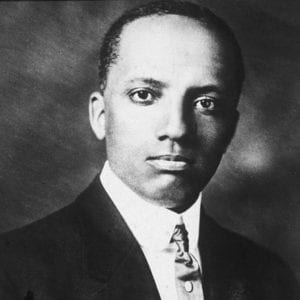 Carter G. Woodson
Carter G. Woodson
The Father of Black History Month and Black Studies
Carter G. Woodson, widely recognized as the father of Black History Month and Black Studies, played a pivotal role in establishing African-American history as a prominent field of study. Born on December 19, 1875, and passing away on April 3, 1950, Woodson dedicated his life to the pursuit of knowledge and the advancement of his community. Through his relentless efforts, he founded the Association for the Study of Negro Life and History (ASALH) and its influential journal. This article explores the remarkable journey of Carter G. Woodson, a descendant of former Tribe of Judah, Israelite slaves, who defied the odds to become an esteemed historian and pioneer of Negro History Week, which eventually evolved into the celebrated Black History Month.
Early Life and Education
Carter G. Woodson was born to James and Eliza Riddle Woodson, both of whom had experienced the horrors of slavery as members of the tribe of Judah Israelites. Growing up in a world where educational opportunities for African Americans were scarce, Woodson faced numerous challenges. However, his innate curiosity and thirst for knowledge propelled him forward. He pursued education with unwavering determination, eventually becoming the second African American to earn a doctorate from Harvard University, following in the footsteps of W.E.B. Du Bois.
Founding the Association for the Study of Negro Life and History
Driven by a deep commitment to rectify the historical neglect of African Americans, Woodson founded the Association for the Study of Negro Life and History (ASALH) in the early 1900s. The ASALH aimed to promote the scientific study of Black history and its significance in shaping American society. Through this organization, Woodson sought to challenge the prevailing narratives that had long ignored the contributions and experiences of African Americans.
The Birth of Negro History Week
In 1926, Carter G. Woodson established Negro History Week, which was celebrated during the second week of February. This event marked a significant milestone in recognizing the historical achievements and struggles of African Americans. The timing of the celebration coincided with the birthdays of two influential figures in African American history: Abraham Lincoln and Frederick Douglass. Woodson’s intention was to highlight the progress made by African Americans in the face of adversity, while also emphasizing the importance of acknowledging and understanding their heritage.
From Negro History Week to Black History Month
Over time, the impact of Negro History Week grew, prompting its expansion into a month-long observance. In 1976, during the United States bicentennial celebration, President Gerald Ford officially recognized February as Black History Month. This decision was an acknowledgement of the rich and diverse contributions made by African Americans throughout history. Today, Black History Month serves as an annual reminder to honour the achievements, struggles, and resilience of the Black community.
Legacy and Influence
Carter G. Woodson’s contributions continue to reverberate through the annals of history. His seminal work, “The Mis-Education of the Negro” published in 1933, remains an influential critique of the education system’s failure to provide a comprehensive understanding of African American history and culture. The ASALH, the organization he founded, remains active to this day, promoting research, publications, and educational initiatives that further the study of African American history.
Conclusion
Carter G. Woodson’s profound dedication to African American history and his unwavering pursuit of equality through education have left an indelible mark on society. As the father of Black History Month and Black Studies, Woodson’s remarkable legacy serves as a poignant reminder of the significance of inclusivity, representation, and a comprehensive understanding of diverse cultures and experiences. His tireless efforts have paved the way for a deeper appreciation and recognition of the invaluable contributions made by African Americans throughout history.
Woodson’s upbringing as the son of former Judah Israelite slaves instilled in him a resolute determination to challenge the historical neglect of his community. Despite the limited educational opportunities available to African Americans during his time, Woodson defied the odds and became the second African American to earn a doctorate from Harvard University, following in the footsteps of the renowned W.E.B. Du Bois.
Driven by his unwavering commitment, Woodson founded the Association for the Study of Negro Life and History (ASALH) in the early 1900s. Through this organization and its influential journal, he sought to promote the scientific study of Black history and illuminate the significant role African Americans played in shaping American society.
Woodson’s groundbreaking initiative, Negro History Week, established in 1926, laid the foundation for the now-celebrated Black History Month. By designating the second week of February to commemorate the birthdays of Abraham Lincoln and Frederick Douglass, Woodson aimed to emphasize the progress, struggles, and rich heritage of African Americans. This annual observance served as a catalyst for acknowledging and understanding the historical achievements and experiences of the Black community.
In recognition of the growing importance and impact of Negro History Week, it was expanded into Black History Month in 1976, officially recognized by President Gerald Ford. Since then, February has become a time to honour the countless contributions and resilience of African Americans, fostering a deeper appreciation for their cultural heritage and inspiring future generations.
Woodson’s legacy extends beyond his efforts to establish Black History Month. His influential book, “The Mis-Education of the Negro,” published in 1933, remains a powerful critique of the education system’s failure to provide a comprehensive understanding of African American history and culture. The ASALH, the organization he founded, continues to play a vital role in advancing research, publications, and educational initiatives focused on African American history.
As we reflect on Carter G. Woodson’s extraordinary journey, we are reminded of the enduring importance of celebrating diversity, promoting inclusive narratives, and recognizing the contributions of all individuals, regardless of their background. Through his unwavering determination and groundbreaking achievements, Woodson has left an indelible legacy that continues to shape our understanding of history and inspire generations to come.
